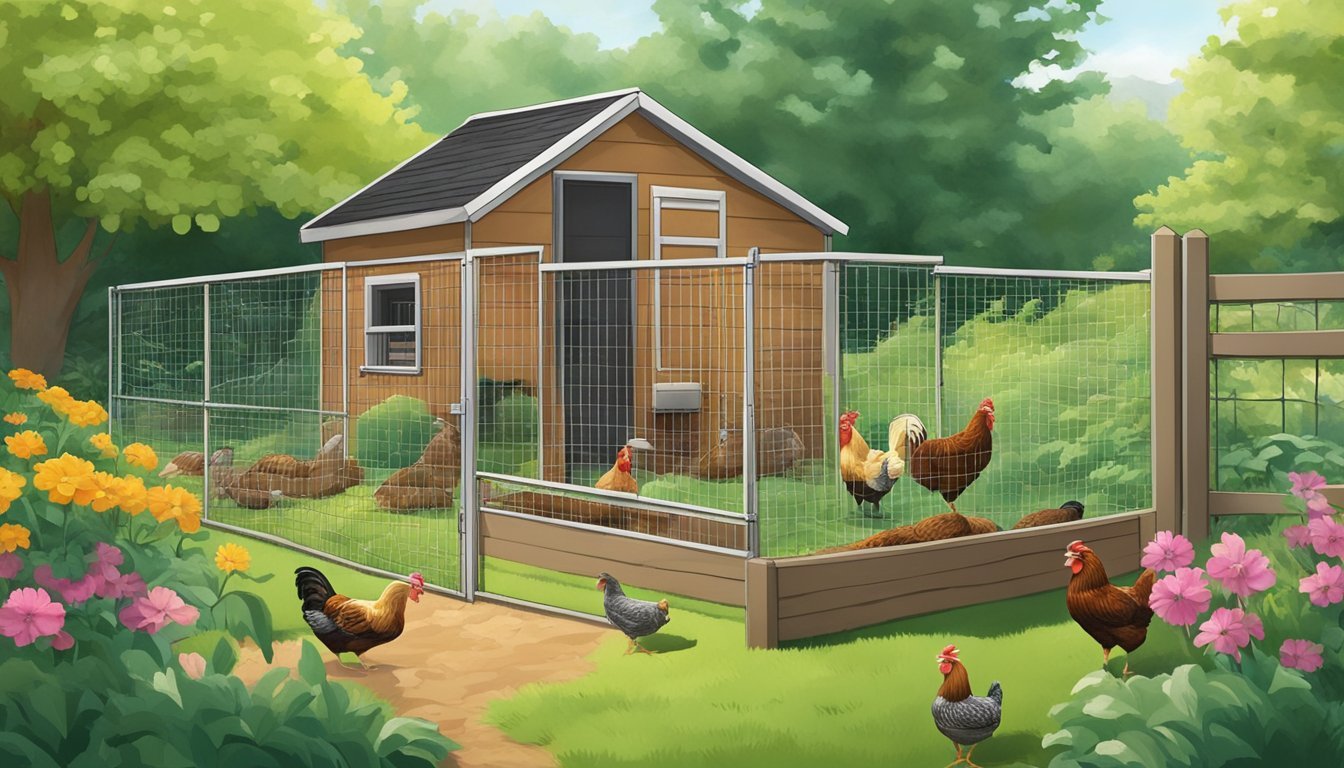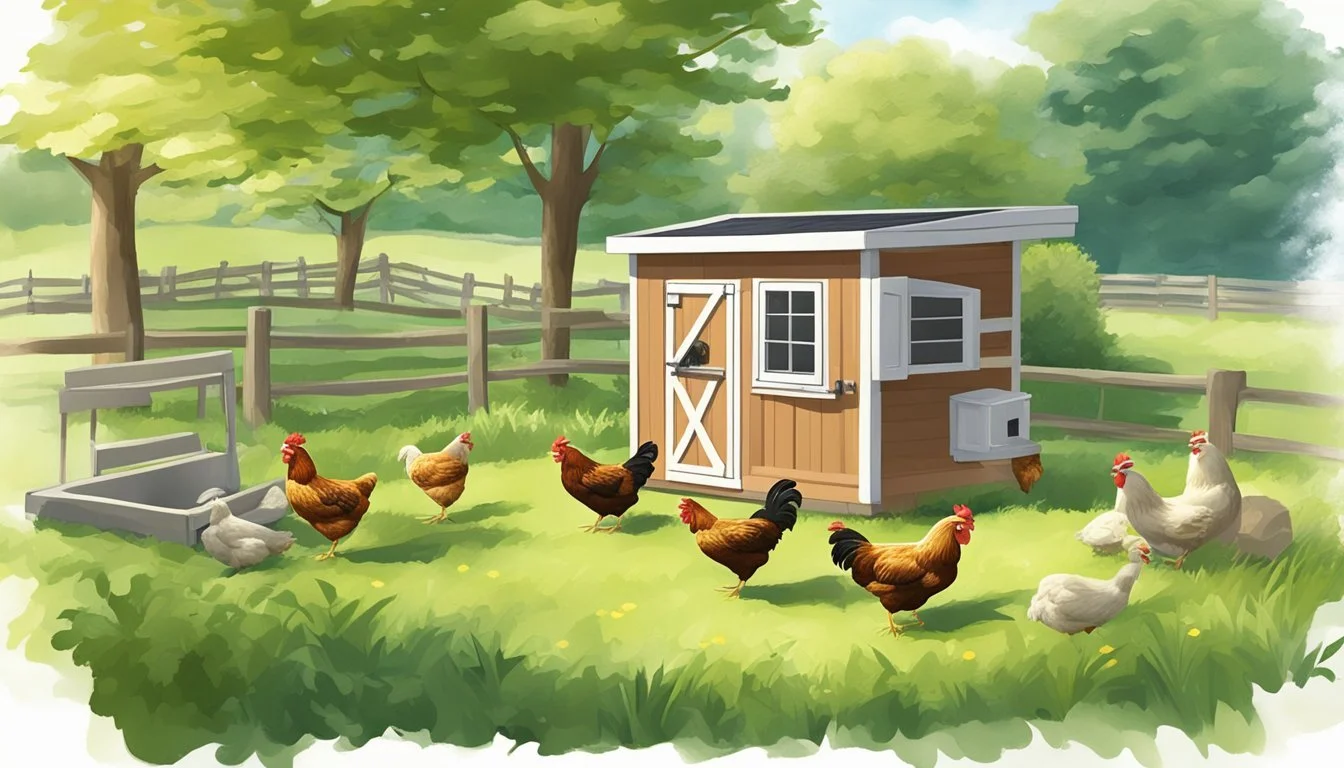Raising Backyard Chickens in Binghamton, NY
A Complete Guide to Urban Poultry Care
Raising backyard chickens has become an increasingly popular hobby in urban and suburban settings, offering a sustainable source of fresh eggs, natural pest control, and the enjoyment of caring for these animals. In Binghamton, New York, the local ordinances permit residents to keep chickens, however, the city has specific regulations in place to ensure that the practice is safe and does not disrupt the community. While roosters are allowed, no permit is currently required for keeping chickens, confirming a degree of flexibility for potential poultry enthusiasts within the city limits.
For those interested in starting their own flock in Binghamton, the city clerk can be contacted for detailed information regarding coop restrictions and other relevant codes. Neighbors are also an important consideration when planning to raise backyard chickens. Since chickens can potentially be a source of noise and odor, coop placement and maintenance are crucial to prevent disturbances. Insights from community groups, such as Binghamton Backyard Chickens on social media platforms, suggest a supportive environment where residents can exchange tips, experiences, and even hatch plans for coop construction and breed selection.
The positive aspects of raising chickens can extend beyond the personal satisfaction and nutritional benefits. Chickens contribute to a household's ecosystem by composting kitchen scraps into valuable fertilizer and by providing natural control for insects and weeds without the need for chemical treatments. As the movement for local, sustainable food grows, Binghamton's residents who engage in raising backyard chickens are part of a larger trend that embraces the connection between food, community, and the environment.
Understanding Local Chicken Laws
In Binghamton, NY, residents are allowed to keep chickens, but must follow specific local laws and ordinances without the need for a permit. Compliance with city zoning laws is essential to ensure adherence to regulations.
Navigating Binghamton's Ordinances
The City Clerk's office is a point of contact for individuals seeking details on keeping chickens in Binghamton. Though the Code is not published online, the Clerk advises on ordinances about poultry-keeping. Residents can contact the City Clerk at 607-772-7005 for information on any restrictions that may apply to chicken coops and care.
Zoning Laws and Permits
Local zoning laws dictate where chickens can be kept and may influence aspects such as the placement of coops. Binghamton does not require a permit for raising chickens, which simplifies the process for prospective poultry keepers. However, it is important to verify any zoning variances that might apply to coop placement and other aspects of property use.
Limitations on Flock Size and Roosters
While Binghamton's ordinances permit the keeping of roosters, specific limitations on flock size may exist. These regulations are in place to maintain public convenience and ensure animal welfare. One must consult with local authorities to obtain the most current regulations regarding the number of chickens and roosters one can legally keep within city limits.
Getting Started with Chicken Keeping
Embarking on the journey of raising backyard chickens requires careful planning and consideration. From selecting the right breeds to ensuring a safe environment for your chicks, here's how you can begin your chicken keeping adventure in Binghamton, NY.
Choosing the Right Chicken Breeds
When selecting chicken breeds, consider the local climate and your egg production expectations. Cold-hardy breeds like the Plymouth Rock and the Rhodeland Red are well-suited to Binghamton's colder temperatures. For those interested in egg laying prolificacy, Leghorns are an excellent choice, since they are known for their high egg output.
Essentials for Raising Chicks
Essentials for raising chicks involve proper feed, water, and shelter. Start chicks on a 18-20% protein starter feed for the first 8 weeks and transition to a 16-18% starter/grower feed until they reach 14 weeks. Fresh water should be available at all times.
Age of Chicks Type of Feed 0-8 weeks 18-20% protein starter feed 8-14 weeks 16-18% starter/grower feed 15-18 weeks 16% finisher or grower feed
Building a Secure Chicken Coop
A secure chicken coop is significant for the safety and comfort of your flock. The coop should be sturdy enough to withstand Binghamton's varying weather and protect against predators. It must have proper ventilation, nesting boxes, and perches. The space required is typically 2-3 square feet per chicken inside the coop and about 8-10 square feet per chicken in an outside run.
Remember, effective chicken keeping starts with detailed preparation and a commitment to providing the best care for your feathered friends.
Daily Care and Maintenance
Daily care and maintenance are fundamental to raising healthy backyard chickens in Binghamton, NY. These tasks are centered around providing a balanced diet, maintaining a clean and secure living environment, and safeguarding the flock from predators and pests.
Feeding Chickens for Optimal Health
The diet of backyard chickens should include a variety of grains, proteins, and greens to ensure their health and productivity. Adult chickens require about 1/4 to 1/3 pound of a balanced layer feed each day.
Grains: Provide energy and should be the primary component of their diet (e.g., corn, wheat).
Proteins: Essential for growth and egg production (e.g., soybean meal, mealworms).
Greens: Supply necessary vitamins (e.g., lettuce, kale).
Grit: Helps chickens digest their food, available free-range or added to their feed.
Oyster Shell: Supplemental calcium source for strong eggshells, offered separately.
Fresh water must be available at all times, replenished daily to prevent algae and pathogens.
Cleaning and Upkeep
Cleanliness is crucial to prevent disease and promote a healthy environment.
Daily Tasks: Remove droppings and check for pests.
Weekly: Replace bedding in the coop and nesting boxes.
Monthly: A thorough cleaning of the coop, including washing and disinfecting where needed.
Quarterly: Clean out the entire coop and replace all bedding materials.
The size of the coop impacts cleaning frequency; more chickens require more frequent maintenance.
Protecting Against Predators and Pests
Security measures are essential to protect the flock from common predators like foxes, raccoons, and hawks.
Fencing: Use chicken wire or hardware cloth around runs and bury edges underground to deter digging predators.
Coop Security: Ensure the coop is sturdy, with no gaps and locking doors. Double-check latches in the evening.
Pest Control: Regularly inspect for signs of rats or mice. Store feed in secure containers to deter vermin.
By adhering to these daily care and maintenance principles, backyard chickens in Binghamton, NY can lead safe, healthy, and productive lives.
Chicken Health and Wellness
Maintaining a healthy flock in Binghamton, NY requires diligent care and a deep understanding of poultry health management. Adequate nutrition, regular health assessments, and prompt treatment of ailments are fundamental for a thriving backyard chicken environment.
Regular Health Checks
Regular health checks are crucial to catch potential issues early. Owners should conduct a visual and physical inspection of each chicken weekly. Key aspects to check include:
Feathers: Look for missing feathers or parasites such as mites or lice.
Eyes: They should be clear and bright; cloudiness or discharge might indicate a health problem.
Beak, Combs, and Wattles: Check for discolorations or abnormal swellings.
Posture and Movement: A healthy chicken should be alert, active, and exhibit normal gait patterns.
Recognizing and Treating Common Ailments
Chickens can be susceptible to a range of diseases, and prompt identification and treatment are essential. Some common ailments include:
Respiratory Infections: Symptoms like sneezing, coughing, and wheezing require attention.
Parasitic Infections: Mites and lice can be treated with appropriate dusting powders or sprays.
Injuries: Minor wounds should be cleaned and disinfected to prevent infection.
Professional veterinary advice should be sought for severe or persistent health issues.
Nutrition, Vitamins, and Supplements
Chickens require a balanced diet to stay healthy. The nutritional plan should include:
Feed: A high-quality pellet or mash that is age-appropriate provides a good nutrition base.
Vitamins and Minerals: Offer a range of supplements to prevent deficiencies, particularly vitamins A, D, and E, which are vital for immune health.
Grit: Providing grit aids in digestion, allowing chickens to grind down and digest their food properly.
Fresh water must be available at all times to aid in digestion and overall health.
Egg Laying Fundamentals
Maintaining productive egg laying in backyard chickens requires an understanding of the laying process, strategies to maximize production, and techniques to ensure egg quality and shell strength.
Understanding the Egg Laying Process
Egg production in chickens is a natural process that begins around the age of 6 months. Factors such as breed, daylight exposure, and nutrition significantly influence when a chicken starts laying and how frequently. For example, breeds like Rhode Island Red and Leghorn are known for their prolific egg-laying capabilities. A reduction in protein intake from 16-18% starting at 8 weeks old can help prevent too rapid growth that may impede future laying performance.
Maximizing Egg Production
To optimize egg production, several key practices should be followed. Firstly, ensure chickens are on a nutritionally balanced diet, necessary for consistent laying. As daylight is crucial for stimulating egg laying, Binghamton residents should aim for 14-16 hours of light daily, either natural or supplemented.
Consistent Light Exposure: 14-16 hours
Nutrition: High-calcium layer feed
Maintaining a stress-free environment for the chickens also aids in achieving stable egg production. A routine schedule for feeding and coop maintenance helps the flock stay calm and reduces disruptions in laying.
Egg Quality and Eggshell Maintenance
Egg quality, especially the strength of the eggshell, depends heavily on the hen's diet. Calcium is integral; a deficiency can lead to thin shells or even shell-less eggs. It is recommended to offer a layer-specific feed that contains higher calcium content for shell integrity. The feed transition should occur around the time the chicks reach laying age to support eggshell maintenance.
Calcium-rich Diet: Layer feed or oyster shell supplement
Age of Transition to Layer Feed: Approximately 16-20 weeks
Proper coop management, including clean nesting boxes and a safe environment, reduces the risk of egg breakage and contamination, further ensuring the consistent quality of the eggs produced.
Advanced Chicken Keeping Topics
For experienced poultry enthusiasts in Binghamton, NY, advancing into the realms of incubating and hatching eggs, along with strategic breeding and genetic management, represents a challenging yet rewarding endeavor.
Incubating and Hatching Eggs
The process of incubating eggs requires precise temperature and humidity control. Incubators must maintain a steady temperature of 99.5°F and relative humidity between 55-65% during the first 18 days, and then increase to 65-75% for the final days before hatching. It's important for the caretaker to turn eggs at least three times a day to ensure even heat distribution until the last three days, when eggs should remain stationary to allow chicks to position for hatching.
Breeding and Genetic Management
Breeding chickens in Binghamton involves selecting traits to enhance the flock's health, productivity, and compatibility with the local climate. Breeders should maintain detailed records of their flocks, including genetic lineage, egg production rates, and physical health markers. When selecting chickens for breeding, one should consider not only productivity but also genetic diversity to avoid inbreeding and ensure the longevity of the flock. Selective breeding allows enthusiasts to focus on desired traits, such as egg-laying capacity, temperament, and resistance to local environmental challenges.







